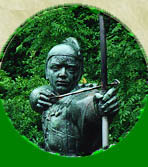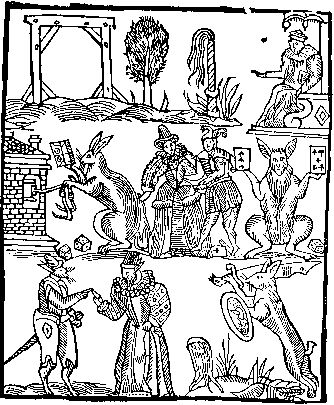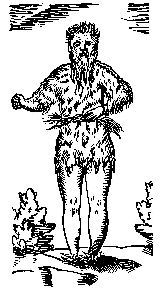
Main Sections
Main Page
Puck Through the Ages:
The History of a Hobgoblin
Puck: A Personal Journey
The Ballads of Robin Goodfellow
Puck Links
A Hobgoblin's Bookstore
Pook's Hill
Information
Site Map
Search This Site
About the Author
My Biography
Send me an e-mail
Copyright
All text, unless otherwise noted, and title graphics - © copyright Allen W. Wright, 2004.
|

The
Mad Merry Pranks of Robin Goodfellow
(Printed,
including the introduction, in The Roxburghe Ballads, with short
notes by W. M. Chappell, FSA. Vol. II - I. Hertford: Printed for the Ballad
Society, by Stephen Austin & Sons, 1872. pp. 80-85)
Introduction
The
First Part
The
Second Part
"Robin
Goodfellow, alias Pucke, alias Hobgoblin, in the creed of ancient superstition,"
says Bishop Percy, "was a kind of merry sprite, whose character and achievements
are recorded in this ballad, and those well-known lines of Milton's L'Allegro,
which the antiquarian Peck supposes to be owing to it:--
"Tells
how the drudging Goblin swet
To earn his cream-bowle duly set:
When, in one night, ere glimpse of morne,
His shadowy flail hath thresh'd the corn
That ten day-labourers could not end:
Then lies him down at the lubber-fiend,
And stretch'd out all the chimney's length,
Basks at the fire his hairy strength,
And crop-full, out of doors he flings,
Ere the first cock his matins rings."
"The reader will observe," again says Percy, "that our simple ancestors
had reduced all these whimsies to a kind of system, as regular, and perhaps
more consistent, than many parts of classical mythology: a proof of the
extensive influence and vast antiquity of these superstitions."
The following ballad is attributed to Ben Jonson, but it is not included
among his published works. It may have been intended for a song in one
of his Masques. Henry Gosson, the printer of this copy, was contemporary
with Ben Jonson. In 1628, and perhaps also before that date, there were
little books in prose about Robin Goodfellow, with songs intermixed in
them. One is entitled, "Robin Goodfellow, his Mad Pranks and Merry Jests.
Full of honest Mirth; and is a fit Medicine for Melancholy." Another, "The
second part of Robin Good-fellow, commonly called Hob Goblin; with his
Mad Pranks and Merry Jests." These were reprinted by the Percy Society,
edited by Mr. J. P. Collier.
A second copy of Gosson's edition of the ballad is included in the Pepys
Collection (I.80), and two editions of later date are in the Bagofrd Collection
(643 m. 9, 51, and 643 m. 10, 118). The tune of this ballad will be found
in Popular Music of the Olden Time.
Upon
the history of the woodcuts to ballads I do not venture. It is the especial
province of those who write upon what is popularly called "Fine Art." I
would merely suggest that the following cut, with the rabbits, is probably
derived from one of Robert Greene's books upon Conie-catching.
[Roxburghe
Collection I. 230, 231]
To
the tune of Dulcina.

From
Oberon in fairyland,
the king of ghosts and shadows there,
Mad
Robbin I, at his command,
am sent to view the night sports here:
What revell rout
Is kept about,
In
every corner where I goe,
I will o'er see,
And merry be,
And
make good sport with ho, ho, ho!
More
swift than lightening can I flye,
and round about this airy welkin soone,
And,
in a minute's space, descry
each thing that's done beneath the moone;
There's not a hag
Nor ghost shall wag,
Nor
cry "goblin!" where I doe goe,
But Robin I
Their feats will spye,
And
feare them home with ho, ho, ho!
If
any wanderers I meet
that from their night-sports doe trudge home,
With
counterfeiting voyce I greet
and cause them on with me to roame,
Through woods, through lakes,
Through bogs, through brakes, --
Ore
bush and brier with them I goe;
I call upon
Them to come on,
And
wend me, laughing ho, ho, ho!
Sometimes
I meet them like a man;
sometimes an oxe, sometimes a hound;
And
to a horse I turne me can,
to trip and trot about them round.
But if to ride
My back they stride,
More
swift than winde away I goe;
Ore hedge and lands,
Through pooles and ponds,
I
whirry, laughing, ho, ho, ho!
When
ladds and lasses merry be
With possets and with junkets fine,
Unseene
of all the company,
I eate their cakes and sip their wine;
And to make sport,
I fart and snort,
And
out the candles I doe blow;
The maides I kisse,
They shrieke, "Who's this?"
I
answer nought, but ho, ho, ho!
Yet
now and then, the maids to please,
I card at midnight up their wooll:
And
while they sleep, snort, fart and fease,
with wheel to threds their flax I pull:
I grind at mill
Their malt [up] still,
I
dresse their hemp, I spin their towe;
If any wake,
And would me take,
I
wend me, laughing, ho, ho, ho!
The
Second Part
To
the same tune.

When
house or harth doth sluttish lie,
I pinch the maids there blacke and blew;
And,
from the bed, the bed-clothes I
pull off, and lay them naked to view:
twixt sleepe and wake
I doe them take,
And
on the key-colde floore them throw;
If out they cry,
Then forth flye I,
And
loudly laugh I, ho, ho, ho!
When
any need to borrow ought,
we lend them what they do require;
And
for the use demaund we nought,
our owne is all we doe desire:
If to repay
They doe delay,
Abroad
amongst them then I goe,
And night by night
I them affright,
With
pinching, dreames, and ho, ho, ho!
When
lazie queanes have nought to doe
but study how to cogge and lie,
To
make debate, and mischiefe too,
twixt one another secretly:
I marke their glosse,
And doe disclose
To
them that they had wronged so;
When I have done,
I get me gone,
And
leave them scolding, ho, ho, ho!
When
men doe traps and engins set
in loope-holes, where the vermine creepe,
That
from their foulds and houses fet
their ducks and geese, their lambs and sheepe:
I spy the gin,
And enter in,
And
seemes a vermine taken so,
But when they there
Approach me neare,
I
leape out, laughing, ho, ho, ho!
By
wels and gils1 in medowes greene,
we nightly dance our hey-day guise,2
And
to our fairy King and Queene
wee chant our moone-light harmonies.
When larkes 'gin sing,
Away we fling;
And
babes new borne steale as we goe;
An elfe in bed
We leave in stead,
And
wend us, laughing, ho, ho, ho!
From
hag-bred Merlin's time have I
thus nightly reveld to and fro:
And,
for my pranks, men call me by
the name of Robin Good-fellow:
Fiends, ghosts, and sprites
That haunt the nights,
The
hags and goblins doe me know,
And beldames old,
My feats have told,
So
Vale, Vale, ho, ho, ho!
Finis.
London,
Printed for H. G.
1
gills = rivulets,
2
Hey-day guise, a misprint for heydegies = rustic dances.
The word occurs in this sense in Lily's Endymion, 1591, and in A
Dialogue, both pleasant and pityfull, by William Bulleyn, 1564, the minstrel
"daunces Trenchmore and Heie de gie, and * * telleth news
from Terra Florida.
|

